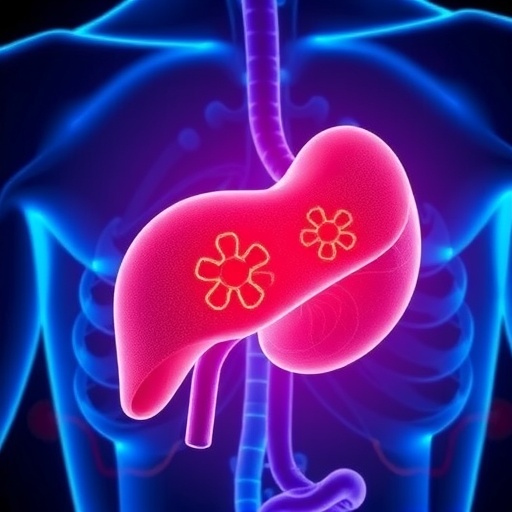
In the rapidly evolving arena of oncology, hepatocellular carcinoma (HCC) stands as a formidable adversary, particularly when diagnosed at an advanced stage. Historically, therapeutic strategies for advanced HCC have encountered significant obstacles due to the tumor’s complex biology, immunosuppressive microenvironment, and limited responsiveness to conventional treatments. However, a recent pivotal article authored by J.M. Llovet, published in Nature Reviews Clinical Oncology (2025), unveils transformative insights into the burgeoning field of novel immunotherapy combinations tailored for advanced-stage HCC management, signifying a paradigm shift in therapeutic approaches.
HCC, the predominant form of primary liver cancer, often presents in advanced stages where curative options such as surgical resection or liver transplantation are no longer viable. The dismal prognosis associated with advanced HCC has propelled extensive research into immunotherapeutic strategies aimed at harnessing the patient’s immune system to combat the malignancy more effectively. Llovet’s exposition provides a comprehensive synthesis of recent clinical breakthroughs, molecular rationale, and translational research that collectively underscore the clinical efficacy and mechanistic underpinnings of combination immunotherapies in HCC.
At the core of these innovative treatments lies the intricate interaction between tumor cells and the immune microenvironment within the liver. The liver’s inherent immune-tolerant milieu, designed to mitigate excessive inflammatory responses to constant antigenic exposure from the gut, paradoxically fosters an immunosuppressive niche favoring tumor progression. Therapeutic modalities that disrupt this tolerant landscape, while simultaneously reinvigorating tumor-directed immunity, represent the crux of the novel immunotherapy paradigm. Llovet meticulously elucidates how combinations of immune checkpoint inhibitors—targeting PD-1/PD-L1 and CTLA-4 pathways—can synergistically reverse T-cell exhaustion and unleash a potent anti-tumor immune response.
.adsslot_acuTky0xbE{ width:728px !important; height:90px !important; }
@media (max-width:1199px) { .adsslot_acuTky0xbE{ width:468px !important; height:60px !important; } }
@media (max-width:767px) { .adsslot_acuTky0xbE{ width:320px !important; height:50px !important; } }
ADVERTISEMENT
Single-agent immune checkpoint blockade had previously shown limited efficacy in HCC due to diverse resistance mechanisms. By contrast, combined checkpoint blockade has demonstrated enhanced clinical outcomes, including improved objective response rates and survival benefits. Llovet highlights clinical trials that illustrate the improved potency of combining anti-PD-1 antibodies with anti-CTLA-4, highlighting the dual reactivation of effector T-cells alongside suppression of regulatory T-cell populations. These findings underscore the necessity of targeting multiple immune regulatory axes concurrently to overcome the multifaceted immune evasion tactics employed by HCC.
Beyond checkpoint inhibition, the integration of immunotherapy with antiangiogenic agents emerges as a groundbreaking approach discussed extensively in the article. Angiogenesis inhibitors, which normalize aberrant tumor vasculature and modulate immune cell infiltration, complement immune checkpoint inhibitors by remodeling the tumor microenvironment into a more immunologically permissive state. Llovet’s discussion of pivotal trials combining VEGF-targeting agents with PD-1/PD-L1 inhibitors illuminates the mechanistic synergy that underlies enhanced therapeutic efficacy, with some combinations attaining regulatory approval based on robust survival gains.
The article also delves into the molecular heterogeneity of HCC, which is increasingly recognized as a critical determinant of immunotherapy responsiveness. Through integrative genomic and transcriptomic analyses, distinct immune phenotypes have been characterized, ranging from immune-inflamed tumors with high lymphocyte infiltration to immune-desert tumors marked by immunosuppression and exclusion. Llovet underscores that precision medicine approaches tailored to these immunological subtypes hold promise for optimizing patient selection and tailoring combination regimens to maximize benefit.
Another notable breakthrough in immunotherapy combinations explored in Llovet’s work is the incorporation of novel agents such as bispecific antibodies and cell-based therapies. Bispecific T-cell engagers (BiTEs) and chimeric antigen receptor (CAR) T-cell therapies are being engineered to specifically target HCC-associated antigens, effectively directing cytotoxic immunity while minimizing off-target effects. The article provides a nuanced discussion of preclinical data and early-phase clinical trials that demonstrate the feasibility and potential of these emerging modalities to complement existing checkpoint and antiangiogenic therapies.
Importantly, the article emphasizes the challenges associated with managing immune-related adverse events (irAEs) that often arise from intensified immunotherapeutic regimens. The liver’s unique immunobiology places patients at risk for severe hepatotoxicity, necessitating vigilant monitoring and innovative management strategies. Llovet highlights ongoing research efforts aimed at identifying biomarkers predictive of toxicity and response, as well as the development of prophylactic interventions to mitigate irAE severity without compromising anticancer efficacy.
Llovet further discusses the role of the gut-liver axis in modulating responses to immunotherapy. The hepatic immune environment is profoundly influenced by gut microbiota-derived metabolites and microbial antigens, which shape systemic and intrahepatic immunity. Recent findings suggest that targeting microbial dysbiosis or leveraging microbiome modulation could potentiate immunotherapeutic success in HCC, adding a new dimension to combination treatment strategies.
Furthermore, advancing imaging and biomarker technologies have facilitated dynamic monitoring of treatment response and immune activation in HCC patients undergoing immunotherapy. Liquid biopsy techniques analyzing circulating tumor DNA and immune cell profiling are uncovered in the article as promising tools to enable personalized adaptation of therapeutic regimens in real-time, enhancing clinical decision-making and potentially improving survival outcomes.
Llovet concludes with a visionary perspective on the future landscape of HCC treatment. He advocates for continued interdisciplinary research aimed at unraveling tumor-immune interactions, optimizing combination regimens, and expanding clinical trial designs to include diverse patient populations. The integration of artificial intelligence and machine learning to predict therapeutic responses and toxicity profiles is identified as an emergent frontier, poised to revolutionize individualized patient care.
In essence, this comprehensive review by J.M. Llovet encapsulates a transformative epoch in HCC management, wherein sophisticated immunotherapy combinations are redefining therapeutic possibilities for a historically refractory malignancy. Through meticulous synthesis of clinical data, mechanistic insights, and translational research, the article charts a compelling trajectory toward durable disease control and improved quality of life for patients battling advanced hepatocellular carcinoma.
The momentum generated by these novel immunotherapeutic strategies holds immense promise for reshaping HCC outcomes and offers a beacon of hope in the broader fight against liver cancer. As these combination therapies move from bench to bedside and beyond, the imperative to deepen our understanding of tumor immunobiology and refine treatment paradigms remains more critical than ever. Llovet’s authoritative contribution stands as a seminal reference point that will undoubtedly inspire and guide clinicians, researchers, and stakeholders invested in conquering advanced-stage hepatocellular carcinoma.
Subject of Research: Novel immunotherapy combinations in the management of advanced-stage hepatocellular carcinoma
Article Title: Role of novel immunotherapy combinations in the management of advanced-stage hepatocellular carcinoma
Article References:
Llovet, J.M. Role of novel immunotherapy combinations in the management of advanced-stage hepatocellular carcinoma. Nat Rev Clin Oncol (2025). https://doi.org/10.1038/s41571-025-01055-5
Image Credits: AI Generated
Tags: advanced liver cancer treatmentclinical breakthroughs in HCCcombination immunotherapy efficacyhepatocellular carcinoma managementimmune system in cancer therapyimmunosuppressive tumor microenvironmentJ.M. Llovet contributionsliver cancer prognosisNature Reviews Clinical Oncologynovel immunotherapy combinationstransformative cancer therapiestranslational research in oncology


